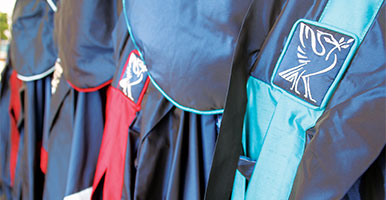The Rt Revd James Jones
Presented by Professor Lord Alton
Pro Chancellor, Vice Chancellor, Distinguished Guests, I have pleasure in presenting the Right Reverend James Jones, Lord Bishop of Liverpool for the award of an Honorary Fellowship from Liverpool John Moores University.
The Latin word "cathedra" doesn't so much refer to a building as to the presence of a seat or throne representing the bishop's authority in governing his diocese, but it is also the symbol of a teacher and it signifies the bishop's role as teacher of his flock.
A bishop's role is primarily a religious one but frequently overlaps with the civic and communal life of a city, region and nation.
Remembering those two functions, of governance and teaching – and his role in our civic life – it is particularly fitting that we are today assembled in Bishop James Jones' own cathedral to admit him as an honorary fellow. Since 1998 Bishop James has served as the Bishop of Liverpool, succeeding the late Lord Sheppard, David Sheppard, also a Fellow of Liverpool John Moores University.
Last week, at a farewell service to mark his fifteen years as Bishop, civic and religious leaders gathered here, along with children from every parish in the diocese, recalling how he was greeted by a child when he first entered the cathedral for his enthronement. The symmetry of beginnings and ending was also captured in the singing of the Prayer of King Henry VI which was sung on that first day of his episcopacy.
It's a prayer which offers total service in whatever is required by the will of God. That service and the many partnerships which have characterised his work during the intervening years was underlined by the presence of leaders from what was sixty years ago, a bitterly divided sectarian community but also tokens of Bishop James' religious and civic roles, a Book of Psalms and the Prisoners Prayer along with the Hillsborough Book of Remembrance.
His role as a reconciler and an educator will particularly be recalled through his chairmanship of the Governing Body of the faith-based St Francis of Assisi City Academy jointly sponsored by the Catholic and Anglican Dioceses and which he helped to establish.
Liverpool has come a long way from a city where its religious leaders refused to celebrate the Lord's Prayer with one another; and more recently, Bishop James, has extended the principles of the Mersey Miracle into deepening the relationships between the great faiths, providing an fine example of tolerance, respect and co-existence.
James Jones came to Liverpool from Hull, where he had been Bishop since 1994.
In this diocese where nearly half of the parishes are designated as urban priority areas he rapidly established a well deserved reputation as a champion of Urban Regeneration. As chairman of the Kensington New Deal for Communities programme he helped breathe new life into a community which had been decimated by bulldozers and neglect. He has always had an aversion to mechanical solutions to organic problems believing that those who have power or access to resources need to help people to help themselves and to grow their own solutions.
Bishop James likes words which resonate with the natural world and during his membership of the House of Lords he has been a foremost champion of sustainability. St.Francis of Assisi became the first Academy to take the environment as its specialism; Hope Academy in Newton, St Helens, became the second. In 2011 he was appointed by the Prime Minister to Chair the Independent Panel on the Future of Forestry.
Unsurprisingly, in May 2003, when he gave this University's 36th Roscoe Lecture, he chose the title "Citizens of the Earth". This concern and interest in our relationship with the world around us manifests itself in his role as a World Wildlife Fund Ambassador. He is Honorary Fellow of the Chartered Institution of Water and Environmental Management and Vice President of the Town and Country Planning Association.
Bishop James is also well known for his radio broadcasts, and is the Church of England's bishop for Prisons.
He has many associations with higher education and is a published author.
Two years ago Bishop James, after undergoing major surgery, wrote a book of reflections and meditations entitled With My Whole Heart. Six months later he saw the removal of his gall bladder but joked that he did not intend to write a sequel called With My Whole Gall Bladder.
Notwithstanding these challenges to his health, it was during these same years that he undertook the work which will give him an assured place in the hearts of countless Liverpool families. In 2009 he was appointed by the Home Secretary to Chair the Hillsborough Independent Panel. Reflecting on the dignity of the families who, in 1989, had been traumatised by this country's worse ever sporting tragedy, Bishop James told the House of Lords "it became apparent to me that a deep wound continued to exist in the community" and, quoting this city's most famous son, Prime Minister William Ewart Gladstone, he concluded that "justice delayed is justice denied".
Through his considerable personal efforts, and the work of his Independent Panel, Bishop James not only gave much needed solace and hope but provided meaning and definition to words like truth, accountability and justice. Along with the ordering of the new inquests into the deaths of Hillsborough's 96 victims, his hugely important report has given Liverpool a sense of catharsis, laying to rest the scandalous misreporting of events and the demonising of a whole city and its people.
Pro Chancellor, Vice Chancellor, Distinguished Guests, it is for these significant and enduring achievements, and with great personal pleasure, that I present the Right Reverend James Jones, Lord Bishop of Liverpool, this most distinguished adopted son of our city, for admission to our highest honour, as an Honorary Fellow of Liverpool John Moores University.



